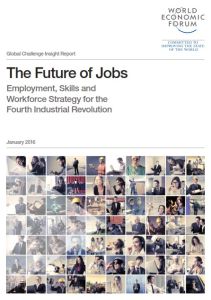Join getAbstract to access the summary!

Join getAbstract to access the summary!
Till Alexander Leopold, Vesselina Ratcheva and Saadia Zahidi
The Future of Jobs
Employment, Skills and Workforce Strategy for the Fourth Industrial Revolution
World Economic Forum, 2016
What's inside?
A World Economic Forum global survey discusses the future of the world of work.
Recommendation
The World Economic Forum conducted a survey of chief human resources officers (CHROs) and other leaders from 371 large companies across a variety of industries to ask what “disruptive changes” will affect jobs around the globe? The survey asked these experts’ what developments they expect will shake up employment in their fields by 2020. Their answers are compelling. They report that the world is on the brink of a “Fourth Industrial Revolution” led by societal and technical change. getAbstract recommends this meaty report to CEOs, human resources officers, recruiters and trainers concerned with staying competitive in the employment world of tomorrow.
Summary
About the Authors
The World Economic Forum is an international nonprofit organization that works with political, business, academic and other leaders worldwide to address global and regional issues.




















Comment on this summary